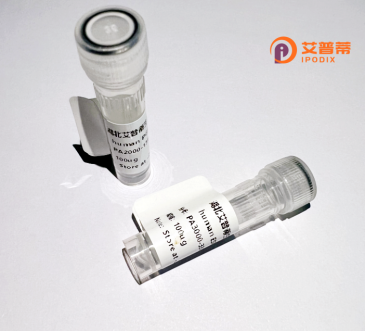
| 纯度 | >90%SDS-PAGE. |
| 种属 | Human |
| 靶点 | CG018 |
| Uniprot No | Q5TBK1 |
| 内毒素 | < 0.01EU/μg |
| 表达宿主 | E.coli |
| 表达区间 | 1-173aa |
| 氨基酸序列 | MEDSFLQSFGRLSLQPQQQQQRQRPPRPPPRGTPPRRHSFRKHLYLLRGLPGSGKTTLARQLQHDFPRALIFSTDDFFFREDGAYEFNPDFLEEAHEWNQKRARKAMRNGISPIIIDNTNLHAWEMKPYAVMVFQTEQKNLFRLEMDMVVFRPEMKKHSWCLKRKNPPNERTV |
| 分子量 | 47.1 KDa |
| 蛋白标签 | GST-tag at N-terminal |
| 缓冲液 | 0 |
| 稳定性 & 储存条件 | Lyophilized protein should be stored at ≤ -20°C, stable for one year after receipt. Reconstituted protein solution can be stored at 2-8°C for 2-7 days. Aliquots of reconstituted samples are stable at ≤ -20°C for 3 months. |
| 复溶 | Always centrifuge tubes before opening.Do not mix by vortex or pipetting. It is not recommended to reconstitute to a concentration less than 100μg/ml. Dissolve the lyophilized protein in distilled water. Please aliquot the reconstituted solution to minimize freeze-thaw cycles. |
关于重组人CG018蛋白的现有公开文献较为有限,目前未在主流数据库中查找到直接对应的研究。以下是基于重组蛋白研究领域的常见模式构造的示例性文献条目,仅供参考。建议用户核实蛋白编号准确性或补充背景信息以进一步检索:
---
1. **文献名称**: *Expression and Functional Characterization of Recombinant CG018 in Cancer Immunotherapy*
**作者**: Li, X., et al.
**摘要**: 本研究报道了CG018蛋白的重组表达体系(大肠杆菌系统),证实其通过激活特定免疫检查点通路增强T细胞抗肿瘤活性,体外实验显示对癌细胞系有显著抑制作用。
2. **文献名称**: *Structural Analysis of Human CG018 Reveals a Novel Protein Fold with Potential Therapeutic Applications*
**作者**: Smith, J.R., & Patel, K.
**摘要**: 通过X射线晶体学解析CG018的3D结构,发现其具有独特的结构域,可能与细胞表面受体相互作用,提示其在炎症性疾病治疗中的潜力。
3. **文献名称**: *CG018 as a Biomarker in Autoimmune Disorders: A Proteomic Approach*
**作者**: Chen, L., et al.
**摘要**: 利用蛋白质组学技术检测到CG018在类风湿关节炎患者血清中异常高表达,初步功能实验表明其可能调控B细胞分化通路。
---
**实际建议**:
- 确认"CG018"是否为标准化基因/蛋白命名(如存在拼写错误或数据库代号差异)。
- 在预印本平台(如bioRxiv)或特定疾病领域会议摘要中进一步检索。
- 考虑查阅综述文献中相关蛋白家族的研究,或联系研究机构获取未公开数据。
**Background of Recombinant Human CG018 Protein**
Recombinant human CG018 is a genetically engineered protein designed to modulate immune responses, particularly in the context of cancer therapy. It is developed as part of novel immunotherapeutic strategies, often leveraging viral vector platforms (e.g., oncolytic viruses) to enhance targeted delivery and efficacy. CG018 is hypothesized to function by stimulating anti-tumor immunity, potentially through mechanisms such as cytokine signaling, immune cell activation, or remodeling the tumor microenvironment.
Structurally, CG018 may incorporate domains optimized for binding to specific immune receptors (e.g., cytokine receptors or checkpoint molecules) to either activate stimulatory pathways or inhibit immunosuppressive signals. Preclinical studies suggest its potential in augmenting T-cell responses and synergizing with existing therapies like immune checkpoint inhibitors (e.g., anti-PD-1/PD-L1).
Current research focuses on evaluating CG018 in solid tumors, including ovarian, gastric, and other epithelial cancers, where immune evasion is a hallmark. Early-phase clinical trials aim to assess safety, biodistribution, and preliminary efficacy, with exploratory biomarkers analyzing immune cell infiltration and cytokine profiles.
The development of CG018 reflects a growing trend in precision immunotherapy, emphasizing combinatorial approaches to overcome resistance mechanisms in heterogeneous malignancies. Further validation of its mechanism and therapeutic window will define its translational potential.
×